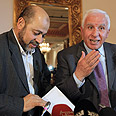
US lawmakers warn against Palestinian unity
'Palestinian Authority has chosen alliance with violence, extremism over democratic values that Israel represents,' bipartisan group of legislators says, while State Department skirts questions over whether aid will continue
After Hamas and the Western-backed Fatah party announced their reconciliation agreement on Wednesday, Democratic and Republican lawmakers warned US funding could not flow to a government that includes a group still on the US list of foreign terrorist organizations.
"The Palestinian Authority has chosen an alliance with violence and extremism over the democratic values that Israel represents," a bipartisan group of US lawmakers said on Thursday after a meeting in Tel Aviv with Prime Minister Benjamin Netanyahu.
Ileana Ros-Lehtinen, the powerful Republican chairwoman of the House of Representatives Foreign Affairs Committee and a staunch defender of Israel, said US law required a halt to support for the Palestinian Authority.
"US taxpayer funds should not and must not be used to support those who threaten US security, our interests and our vital ally, Israel," Ros-Lehtinen said in a statement.
Nita Lowey, the senior Democrat on the House Appropriations subcommittee that approves foreign assistance, said any Palestinian unity deal with an unreformed Hamas "will be a death blow to the peace process."
The Obama administration reacted coolly to the Hamas-Fatah announcement, saying any future Palestinian government must renounce violence, respect past peace agreements and recognize Israel's right to exist.
Hamas, founded on a charter that calls for Israel's destruction and in power in the Gaza Strip since 2007, appeared unlikely to comply with these demands. But it remains unclear exactly what role it might play in a unity arrangement with President Mahmoud Abbas' Fatah that governs the West Bank.
But the Palestinian announcement promises to complicate US President Barack Obama's drive to relaunch direct Middle East peace talks, which stalled last year despite Obama calling for a deal by this September to establish a Palestinian state.
An official source in Jerusalem said after learning of the deal that "the Palestinians have in effect ceded America". Others said the Palestinian Authority would lose support in Europe for their upcoming declaration of statehood in September as well.
"The agreement came as a surprise to many in the US and even to some officials in the Palestinian Authority," one Israeli official said. "Fatah wants to take part in a government with an element clarifying that it is unprepared to negotiate with Israel. The world will not be able to blame us."
Over $3.5 billion since 1994
The United States has given an average of about $400 million per year to the Palestinian Authority headed by Prime Minister Salam Fayyad, much of it aimed at strengthening governance and security in preparation for eventual statehood.
Total US assistance since 1994 has topped $3.5 billion.
A Congressional Research Service report last year said a potential unity government could drop the development and reform objectives set by the Fayyad administration, which are used as major justifications for current US aid levels.
It also said that as long as Hamas refuses to agree to the basic benchmarks on renouncing violence and accepting Israel, the United States could not legally continue assistance to any unity government of which it is a part.
The questions over Palestinian aid come amid a broader debate over US foreign aid levels, which many Republicans have vowed to cut to help rein in the US budget deficit.
"In the current budget environment, all of our foreign assistance needs to be carefully examined," Kay Granger, the Republican chair of the foreign appropriations subcommittee, said in a statement on Thursday.
"If a power-sharing agreement with a terrorist organization becomes a reality in the Palestinian territories, the US will be forced to reexamine our aid to the Palestinian Authority."
The State Department on Thursday did not immediately respond to questions about Palestinian aid.
Political analysts said the Obama administration will likely move cautiously as it awaits details on the unity deal ahead of a visit by Netanyahu to Washington next month.
Netanyahu has said the Palestinian Authority must choose either peace with Israel or peace with Hamas. But with Palestinians pushing hard for unilateral UN recognition of statehood in September, both he and Obama may come under fresh pressure now to find a way back to peace talks.
"We're going to go through a period of unrealism by Israel and the United States, where they are going to say we can't have a unity government which includes Hamas. But I don't think that's going to hold water for very long," said Stephen Cohen, head of the Institute for Middle East Peace and Development.
"The truth is that this is the first opening to some possibility that the Palestinians will be able to negotiate seriously with Israel, with all hands on deck."
Attila Somfalvi contributed to this report
- Follow Ynetnews on Facebook










